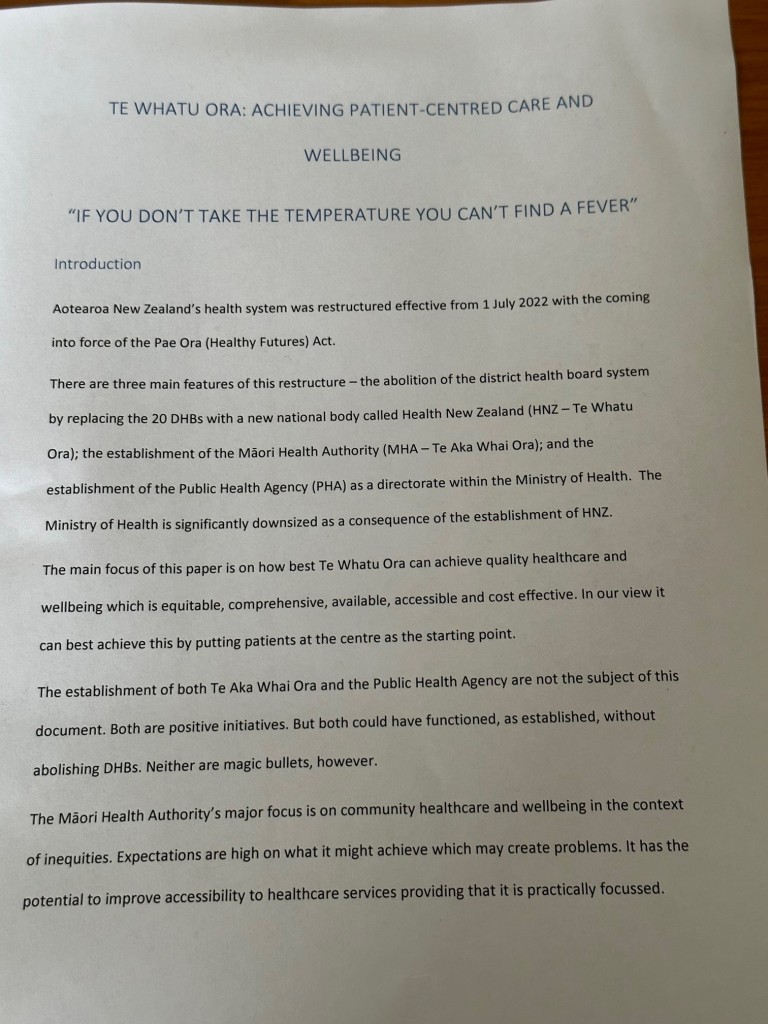Recently BusinessDesk published an article which really caught my eye. It was by Ian McCrae, founder and former Chief Executive of Orion Health, a major health software technology company. What struck me even more was a perceptive response from a medical specialist in social media.
McCrae’s article is one of a series he has published describing what he learnt from his harrowing experience of being confronted with a seriously life threatening brain tumour. His respect for the skill and commitment of health professionals shines brightly.
But he goes further to analyse the problems with the current state of the health system. Insights from patients such as McCrae can be valuable for health systems to learn how to do things better at various levels.
This particular article (21 March) is written in the context of the challenge inherited by new Minister of Health Dr Ayesha Verrall: 2 Bugger, I’m the new Minister of Health.

Ian McCrae: insightful piece of writing
McCrae puts himself in the Minister’s shoes who he imagines saying to herself:
The whole system is quickly descending to hell in a handbasket and every day the news gets worse. So, there’s no time to park the problem in a think tank or expert review panel. There’s no time to grow the health workforce, either. It takes 11 years to fully train a general practitioner and five years for a registered nurse. By then, I will be fired and sitting with the numpties on the back benches. What’s the answer? Surely someone – somewhere – has solved this problem before.
Answering the Minister’s imagined question: its subsidiarity
He has the answer. It can be found in the standout performance of the former Canterbury District Health Board (CDHB) from the mid-2000s to 2020. CDHB’s integrated health pathways between community and hospital were successful in constraining acute patient demand.
This was because they were clinically developed and led by health professionals working in both community and hospital care. It would not have happened without a strong focus on relationships leading to trust in order to enable an engagement culture to develop that was previously missing.
Decisions were based on what made best clinical sense in many different branches of medical care. The engagement culture that led to this outcome, and was strengthened by it, provided the basis for Canterbury DHB’s outstanding response to the post-2011 earthquake health crisis.
McCrae argues correctly that Canterbury’s experience was an excellent example of the ‘principle of subsidiarity’. That is, in the context of a health system, central government should only perform those tasks that can’t be performed at a more local level.
His time frame is wrong; rather than “pivot” to subsidiarity in 2011-12, Canterbury did this a few years earlier. But he is right about its importance and success. He is also right to say that subsidiarity is the “polar opposite” of our current health restructuring.
In particular, the replacement of district health boards (DHBs) by the new highly centralised Te Whatu Ora (Health New Zealand) last July. DHBs were the structures developed to enable subsidiarity to work.
In fact, prior to this restructuring New Zealand already had one of the most centralised health systems in economically developed economies.
McCrae discusses this at length and does so well. His article is a good read. This includes covering in detail the cost-effectiveness of Canterbury’s approach and its international recognition. He also discussed the “dirty politics” which brought this engagement culture to an end in 2020, including referring (with links) to articles written by myself and investigative pieces by David Williams published by Newsroom.

Heather Roy and Ian Powell: first take the temperature, then find the fever
He then proceeds to advise the new health minister to return to the ‘principle of subsidiarity’ to resolve her challenge. This is similar to the joint paper by myself and my political opposite Heather Roy titled If you don’t take the temperature you can’t find a fever: Take the temperature to find the fever.
Criticality of trust
McCrae’s analysis is similar to mine. Upon reading it I distributed it in my social media outlets. Coverage on Twitter was extensive. Also pleasing was LinkedIncoverage. I was particular struck by this insightful response to McCrae’s article by prominent Canterbury surgeon, Saxon Connor (22 March)
This is spot on. But what it doesn’t allude to is that approach didn’t happen by chance. There was almost a decade of “trust building” that allowed a system network to develop which embraced change based on underlying values of respect, empathy and psychological safety.
However my observation is since the change we have seen loss of those networks, trust and respect. People are now disengaging on [a] daily basis. The old way of working cannot simply be turned back on. It will require starting from scratch to rebuild trust. Paraphrasing David Meates [former Canterbury chief executive] “Change can only happen at the speed of trust”. I don’t think people quite yet understand what they have lost from the Canterbury health system over the last 2 years. [minor typos corrected]
Saxon Connor has nailed it with his highlighting of the importance of trust. The surgeon is describing the change since the effective ‘removal’ of Canterbury DHB chief executive David Meates and his senior management team in 2020.

David Meates: change only happens at the speed of trust
This was achieved by a Government endorsed ‘bureaucratic coup’ orchestrated by the Health Ministry with the support of EY business consultants and other appendages.
Since then, and it’s not a long time ago, “…we have seen loss of those networks, trust and respect. People are now disengaging on [a] daily basis. The old way of working cannot simply be turned back on.” As the paraphrased David Meates said: “Change can only happen at the speed of trust”.
How trust in Canterbury was lost, regained and lost again
In the mid to late 1990s there were increasing concerns by senior medical staff in Canterbury about senior management driven changes, particularly involving the loss of experienced nurses, effecting patient safety and leading or contributing to deaths. Senior management disregarded these concerns.
Consequently senior medical staff made a formal complaint backed up by specific patient cases to the newly established Health & Disability Commissioner. After a thorough investigation the Commissioner upheld the complaint. But the whole controversy left a bitter loss of trust in the senior management leadership that was to plague its successors for some years.
It was not until 2006 with the arrival of a new very experienced chief executive, Gordon Davies, that trust began to return. He not only knew the health system well. He also understood the importance of both relationships and good engagement with health professionals.
Without this developing trust it is difficult to see how the successful health pathways between community and hospital would have happened.

Gordon Davies: focussed on rebuilding trust through relationships in Canterbury
The contribution of Davies’ successor David Meates was to build on this trust and strengthen it further. The contribution of the oppositional Health Ministry top leadership was to destroy it. It is going to take a long time for this to be restored in Canterbury, especially under the even more centralised health system that we now have.
The ‘execution’ of Canterbury’s leadership also served as a steely reminder to the other DHBs to toe central government’s line even when knowing it was wrong and even behind closed doors.
Trust loss pervading whole health system
Today loss of trust pervades the health system thereby impeding its performance. The Government contributed to this by focussing on restructuring rather than on the pressures on the system, particularly workforce shortages.
It lost trust by engaging external business consultants to design this restructuring instead of using the expertise within the health system. Government lost sight of the obvious; those who do the job know best how to improve it.
Further, Government lost trust by implementing this restructuring in the midst of a pandemic. This was unbelievable absurdity and incompetence from political leaders living in their detached bubble.
Finally, it lost trust by leaving a legacy of an exhausted health professional workforce and a health system in much worse shape than the poor shape it inherited in 2017.
Trust is now being lost with the culture of the highly top-down leadership culture of Te Whatu Ora. The experience to date is that the culture is more vertical, controlling and authoritarian than before as well as being less transparent. All of this was predictable.
The ridiculousness of having top level positions called ‘Wayfinders’ encouraging Star Wars images of Darth Vader and the Ancient Sith only adds to the loss of trust.
If there is a bright side, and it is only a small one, Te Ake Whai Ora (Māori Health Authority) appears not to have the same cultural characteristics.

Call in the subsidiarity tunnellers now Dr Verrall
Ian McCrae’s vision of a return to the ‘principle of subsidiarity’ would make a huge difference to the health system and greatly assist Ayesha Verrall to overcome the mess she has inherited.
But this requires trust and there is no light at the end of the tunnel yet, partly because there is no light and partly because it is a very long tunnel.
Call in the tunnellers Dr Verrall, post haste!
Ian Powell was Executive Director of the Association of Salaried Medical Specialists, the professional union representing senior doctors and dentists in New Zealand, for over 30 years, until December 2019. He is now a health systems, labour market, and political commentator living in the small river estuary community of Otaihanga (the place by the tide). First published at Otaihanga Second Opinion





ChCh healthcare has still been terrible the last decade or two.
Health, or rather the lack of it, is just another profit-making resource for the neoliberal empire. Our health is a commodity and a lack of good health can become ‘good coin’ in the hands of those who only understand how to make money at the expense of those less fortunate. Think ‘mafia’ but with less soul and no class.
The four now foreign owned banksters steal $180.00 a second from our economy. ( ANZ.ASB.BNZ.Westpac.)
What might $180.00 a second pumped into public health do to public health? Pep it up a bit I’d imagine.
RNZ/Chloe Swarbrick
“Green Party wants immediate action on bank profits”
https://www.rnz.co.nz/national/programmes/morningreport/audio/2018881050/green-party-wants-immediate-action-on-bank-profits
RNZ
“Banks make new record profits amid strong inflation, rising interest rates”
https://www.rnz.co.nz/news/business/485914/banks-make-new-record-profits-amid-strong-inflation-rising-interest-rates?utm_source=pocket_saves
Here we are, standing back mumbling while four foreign owned banks literally steal our money ( @ $180.00 a second remember.) while we struggle to cope with a deliberately underfunded public health system which is, in reality, being sabotaged by privateers who’ve been lobbied into diverting sick Kiwi’s into a rapaciously greedy, racist, fascist, sexist private heath monopoly just to turn over our cash to foreign share holders. But then one could always just die I suppose.
People!? Never mind what politicians and the MSM tell you. What do the facts say?
The problems in our health system go back to the early 1990’s when National embarked on their health reforms. Whilst letterheads have changed, and papers have been reshuffled, the key aspects of the reforms are still in place. For example, hopsitals still have to make a profit and pay a dividend to the government. Its just called a “capital charge”.
The nurses union and medical officers’ associations should have threatened to strike if the sudden abolition of elected hospital boards went ahead.
Much the same thing was needed to halt the highly unpopular mass closure of regional hospitals.
The health system is the marketing department for big pharma. The way the general public were treated the last 3 years is beyond forgiveness. It’s only going to get worse as long as ethics don’t matter.
So massive funding of our health system the last 3 years is worse than Nationals 9 years of under investment in infrastructure, paying private hospitals millions for catch up procedures they created ?
With people like you living in our country no wonder New Zealand is buggered.
Hey Squeaky, labour have been in charge since 2017. National are equally crap. The problem with emotional partisan hacks like yourself is you’re constantly making crappy excuses for your teams failings and corruption. You’re just raging on behalf of the machine and it’s pathetic.
Hey whitey. What’s pathetic is you. No critical thinking behind why health is the way it is.
If I leave metal in the ocean over time it will rust, it won’t happen over night. Like health it has taken years to get to this point. Last year was the biggest investment in health in our history. Now we must allow time for that investment to blossom, yet you blame Labour for all the previous years of awful governance and that is pathetic.
Big investment = drug companies fat profits at the expense of the people. Keep defending your side though, your emotional arguments make them happy.
That makes no sense much like everything else you comment on.
“drug companies fat profits at the expense of the people”
Provide evidence.
Trust? Is that like faith based healthcare? Pray to any god that you don’t get ill and that if you get ill you may die quickly and painless, because there is no doctor or nurse in this country that actually would see you in time? Oh my. How progressive.
it’s really really easy…adiquatly fund and treat
culling managers wouldn’t hurt either…they are the useless eaters
If bureacrats, consultants, management and politicians didn’t get to ride their pendulum of centralise, decentralise, recentralise, localise, super-size, back and forth how could they justify their salaries and extract resources from actual work.
KPMG and co: Well we dragged it out for 20 years but all the hospitals are being run by District HBs like National wanted. How are we going to consult a buck now?
McKinsey: We have just written a white paper which aligns with Labour style big government. It concluded centralised health is best …..
Ad infinitum.